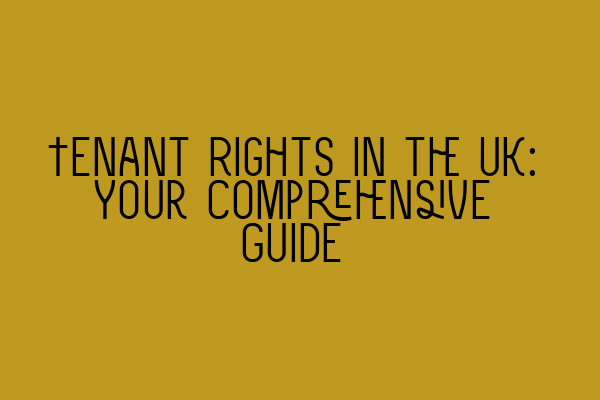Tenant Rights in the UK: Your Comprehensive Guide
Are you a tenant in the UK? It’s crucial to understand your rights and responsibilities to ensure a smooth tenancy. Whether you’re renting a residential property, a commercial space, or even an agricultural land, this comprehensive guide will provide you with all the essential information regarding your tenant rights in the UK.
1. Understanding Your Tenancy Agreement
Before diving into your rights as a tenant, it’s important to familiarize yourself with your tenancy agreement. This legal document outlines the terms and conditions of your tenancy, including the rent, duration, and responsibilities. Make sure to read it thoroughly, ask for clarification if needed, and keep a copy for future reference.
If you have any concerns or questions about the tenancy agreement, it’s advisable to consult with a property law solicitor to ensure you fully understand your rights and obligations.
2. Security of Tenure
The UK offers tenants the right to security of tenure, which means you have the right to stay in the property as long as you pay your rent, abide by the terms of the agreement, and don’t breach any laws. This right provides stability and protects you from arbitrary eviction.
However, it’s important to note that there are exceptions to this right, such as if you’re renting a holiday let, a property subject to a mortgage, or if the landlord is seeking possession due to specific reasons outlined in the law.
For detailed information on security of tenure and its exceptions, check out this SQE 1 Practice Exam Questions article.
3. Rent and Rent Increases
As a tenant, you have the right to know how much rent you should pay and the frequency of payment. Rent increases during the tenancy are generally subject to negotiation and must be outlined in the tenancy agreement or through a formal notice. However, certain types of tenancies have rent control rules that limit the landlord’s ability to increase the rent.
If you believe your rent increase is unjustified or excessive, you can seek advice from a property law solicitor to understand your options.
To explore rent and rent increase guidelines in detail, you may want to read this SQE 1 Practice Mocks FLK1 FLK2 article.
4. Repairs and Maintenance
One of the most critical rights as a tenant is to live in a safe and habitable property. Your landlord is responsible for maintaining the property and conducting necessary repairs. It’s essential to report any defects or issues promptly to your landlord or the property management company.
If your landlord fails to fulfill their repair obligations, there are legal steps you can take to ensure the necessary repairs are carried out. Seek legal advice to understand the process and your options.
For detailed information on tenant rights regarding repairs and maintenance, check out this SQE 2 Preparation Courses article.
5. Deposits and Tenancy Deposit Protection
When you rent a property in the UK, your landlord may request a deposit. It’s crucial to ensure that your deposit is protected through a government-approved tenancy deposit protection scheme. This protects your deposit and ensures it will be returned to you at the end of the tenancy, minus any legitimate deductions.
If your landlord fails to protect your deposit or unjustly withholds it, you have the right to take legal action. Seek legal advice to understand the process and the available remedies.
If you wish to explore detailed information on deposits and tenancy deposit protection, you can refer to this SQE 1 Preparation Courses article.
6. Eviction and Notice Periods
In certain circumstances, your landlord may wish to evict you. However, they must follow the proper legal procedures to do so. Depending on the type of tenancy, there are different notice periods required for eviction.
It’s essential to understand your rights and the correct process to challenge any wrongful eviction attempts or if you believe your landlord hasn’t followed the proper eviction procedures.
To know more about eviction and notice periods, refer to this informative article on SRA SQE Exam Dates.
7. Discrimination and Harassment
Tenant rights in the UK include protection against discrimination and harassment. Landlords are not allowed to discriminate against tenants based on their race, gender, sexual orientation, religion, disability, or other protected characteristics.
If you feel you have experienced discrimination or harassment, it’s vital to seek legal advice promptly. There are legal avenues available to address such issues and protect your rights.
For detailed information on tenant rights regarding discrimination and harassment, check out this SRA SQE Exam Dates article.
Final Thoughts
Understanding your tenant rights in the UK is crucial for a smooth and secure tenancy. Familiarize yourself with your tenancy agreement, know your rights regarding security of tenure, rent, repairs, deposits, eviction, and discrimination.
If you have any concerns, it’s advisable to consult with a property law solicitor who can provide expert guidance suitable for your specific situation.
Remember, knowledge is power, and being well-informed about your tenant rights will help you protect your interests and enjoy a peaceful tenancy.
For more legal guidance and preparation materials for SQE exams, visit our related articles:
